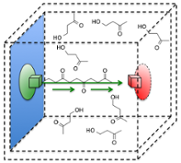‘In-the-box’ idea awarded €2M in NWO-TOP programme
Chemists from the University of Amsterdam and the University of Groningen are starting a large-scale collaboration on ‘Catalysis in Confined Spaces’, a TOP-PUNT project which was awarded EUR 2 million this week by the Netherlands Organisation for Scientific Research (NWO). The aim is to learn how catalysts work in nano-structured spaces, which should result in more efficient and cleaner chemical processes and catalysis-driven nano-machines
This five-year project will research a simple yet baffling question: How does a catalyst work when it is constrained in a small ‘box’ of nanometer dimensions? This may seem trivial, but being ‘close to the wall’ is very different than being ‘in the middle of the crowd’, as any student who has been to a large music festival will tell you.
The groups of Profs. Gadi Rothenberg, Joost Reek ( Van 't Hoff Institute for Molecular Sciences, Amsterdam) and Ben Feringa (Stratingh Institute for Chemistry, Groningen) have joined forces to tackle this challenge. The grant will be used to fund eight PhD projects.
Molecular cages
The eight PhD students will design, synthesize and study various types of soluble and solid (supra)molecular cages. By trapping catalysts in the cages or into the cage walls, the teams will create tailored reaction environments. ‘This reduces the degrees of freedom the molecules experience’, Ben Feringa explains. ‘So we would expect that in this nanostructured environment, catalysts function more precise. Early results show that catalysis can indeed be much faster.’
The two PhD students in Groningen will focus on self-assembly of nanostructured environments containing catalysts. ‘For example, a nanopore with a catalyst inside it – the pore could then select the substrate.’ Also, they will look for new catalytic conversions, especially in water. Using water rather than organic solvents reduces toxic waste in chemical processes. A final theme for the projects at the Feringa group is the use of confined catalysts to propel nanomachines. ‘We have a long tradition in the design of nanomachines, and would very much like to use catalysts in confined space to power mechanical work.’

Main purpose
The main purpose of the project is to increase basic knowledge on catalysis in nanostructured spaces. ‘We believe there is an enormous potential, but to realize this, we first have to learn how these catalysts work.’ Another important goal is to cement the ties between both the chemistry departments, bringing together expertise in homogeneous catalysis, heterogeneous catalysis, bio catalysis and organic synthesis.
Rothenberg, who has coordinated the proposal, is very happy with the result: ‘When we started thinking about catalysis in confined spaces, we quickly realised that this is an intricate problem that can only be solved by a coordinated effort. The concept wherein all of the results, methods and equipment will be shared by all researchers increases the chances of the project’s success’. ‘We have a lot to offer each other’, Feringa adds. ‘And we are very proud that this project was selected by an international review committee, in a very strong competition.’
Project co-supervisors are: dr. Jarl Ivar van der Vlugt, dr. Stefania Grecea, dr. Raveendran Shiju, dr. David Dubbeldam, dr. Jan van Maarseveen, prof. dr. Bas de Bruin (all from UvA), prof. dr. Wesley Browne and dr. Sander Wezenberg (both University of Groningen)
More information
Prof Ben Feringa, +31 50 3634278, b.l.feringa@rug.nl
Sustainable Chemistry, University of Amsterdam
Stratingh Institute for Chemistry
www.benferinga.com
More news
-
19 December 2025
Mariano Méndez receives Argentine RAÍCES award
-
18 December 2025
Why innovate, and for whom?
-
17 December 2025
Ben Feringa wins Feynman Prize
